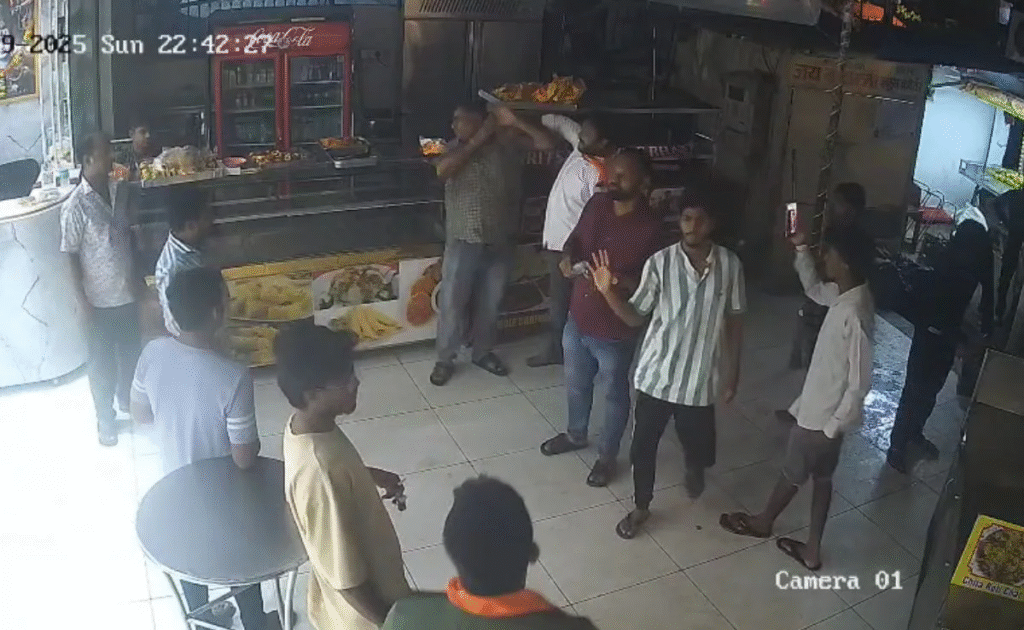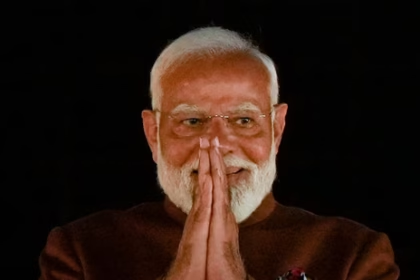Raj Thackeray’s MNS Workers Assault Shopkeeper for Refusing Marathi – Shocking Incident Caught on Camera in Mumbai
MNS party workers allegedly assaulted a Mumbai shopkeeper for refusing to speak Marathi. The incident, linked to Raj Thackeray’s party, has sparked outrage
A shopkeeper in Mira Road was assaulted by workers of the Maharashtra Navnirman Sena (MNS) on Saturday evening after he allegedly refused to speak in Marathi – an incident that was caught on camera and has since gone viral.
The video shows three men entering a sweets shop and confronting the owner over his language. When questioned about not using Marathi, the shopkeeper tried to explain, saying, “I didn’t know Marathi was compulsory. Someone will have to teach me.” One of the men warned him, “Maar khayega?” (Do you want to get beaten?), before the conversation escalated.
The workers then demanded to know what state he was working in. “Maharashtra,” the shopkeeper replied. “What language is spoken in Maharashtra?” one of the workers asked. “All languages are spoken here,” the shopkeeper responded – a remark that appeared to provoke the attackers.

Within seconds, two men began slapping him – one of them striking him multiple times, including with the back of his hand, as the shopkeeper struggled to respond. Another man could be heard hurling abuse and warning him he wouldn’t be allowed to run a business in the area.
The Kashimira Police registered an FIR against seven MNS workers under various sections of the Bharatiya Nyaya Sanhita (BNS), including charges of spreading unrest. An investigation is underway.
Santosh Rane, the MNS’s Mira-Bhayander district president, defended the action, saying, “If anyone insults the Marathi language, MNS will respond in this manner. In Maharashtra, only Marathi is allowed, and you will have to follow Marathi culture, even if you’re Gujarati or Marwari.”
Rane claimed the confrontation began when the shopkeeper misbehaved with MNS workers who were celebrating the Maharashtra government’s decision to withdraw its earlier resolutions on implementing the three-language policy in schools.
The Raj Thackeray-led MNS has been at the forefront of opposing the three-language formula. The party had even planned a major protest in Mumbai on Saturday against the policy, which mandates the teaching of Hindi, English, and Marathi in Maharashtra’s schools.

Following the backlash, Chief Minister Devendra Fadnavis announced that the state had withdrawn two earlier resolutions on the policy and would form a new committee to reassess the matter.
“We have decided that a committee will be formed under the leadership of educationist Narendra Jadhav to determine from which standard the languages should be implemented, how the implementation should take place, and what choices should be given to students. Based on the report submitted by this committee, the state government will make a final decision on the implementation of the three-language policy,” Fadnavis said.
A shocking incident unfolded in Mumbai as workers from the Maharashtra Navnirman Sena (MNS), led by Raj Thackeray, allegedly assaulted a local shopkeeper for refusing to converse in Marathi. The confrontation, which reportedly escalated from a verbal exchange to physical violence, has sparked public outrage, renewed debates on linguistic nationalism, and drawn criticism from across political lines.
This incident raises urgent questions about freedom of language, political intimidation, and regional identity politics in Maharashtra. Here’s a detailed account of what happened, the political reactions, the legal implications, and the broader societal impact.
According to police sources and eyewitness reports, the incident occurred in a bustling commercial area of Mumbai. A group of MNS workers—estimated to be around 5 to 7 individuals—entered a shop to make a purchase. The shopkeeper greeted them in Hindi, prompting the group to demand that he speak in Marathi, the regional language of Maharashtra.
When the shopkeeper declined, citing his limited knowledge of Marathi, the verbal exchange allegedly turned violent. The workers reportedly beat the shopkeeper, causing injuries and damaging the shop’s property. Video footage of the attack, now circulating on social media, shows one man being pushed and slapped while others shout slogans in Marathi.
- Location: Central Mumbai
- Number of assailants: Approximately 5–7 MNS workers
- Injury Report: Shopkeeper sustained minor head injuries
- Police Status: FIR filed, investigation underway
The Maharashtra Navnirman Sena (MNS), founded by Raj Thackeray in 2006 after splitting from the Shiv Sena, has long adopted a pro-Marathi stance. The party has previously been involved in campaigns promoting the primacy of the Marathi language and culture, especially in Mumbai, which they argue is being “overrun” by Hindi-speaking migrants from North India.
MNS Language Agenda:
- Marathi signboards: MNS has frequently targeted shop owners and businesses for not displaying names in Marathi.
- Employment priority: The party has demanded job quotas for Marathi-speaking locals.
- Cultural preservation: Raj Thackeray often emphasizes that migrants should learn Marathi as a mark of respect to the state.
This incident appears to be an extreme manifestation of this ideology, drawing parallels to similar actions taken by MNS cadres in the past.
The incident has triggered a storm of political responses, ranging from condemnation to cautious justification.
a. Opposition Leaders:
Congress and NCP leaders condemned the violence, calling it “mob justice” and a violation of citizens’ rights.
b. Ruling Government:
The state government, led by the Shiv Sena–BJP alliance, has ordered an inquiry but stopped short of directly criticizing the MNS.
c. Raj Thackeray’s Silence:
As of this writing, Raj Thackeray has not publicly commented on the incident. Critics argue that this silence is telling and suggests tacit approval or an unwillingness to rein in party extremists.
Following public outcry, Mumbai Police swiftly registered an FIR under the following charges:
- Section 323 (Voluntarily causing hurt)
- Section 506 (Criminal intimidation)
- Section 147 (Rioting)
- Section 427 (Mischief causing damage)
The police have reportedly identified the accused through CCTV footage and viral social media clips. Two individuals have already been detained for questioning, and further arrests are likely.
Senior police officials have also urged the public to report such incidents and reiterated that “vigilante enforcement of language or culture is a punishable offense.”
The assault has gone viral on Twitter, Instagram, and Facebook, with netizens using hashtags such as:
- #SpeakYourLanguage
- #MNSAttack
- #RajThackeraySilence
- #MarathiNotByForce
Many users condemned the act as an infringement of personal liberty. Prominent activists and artists from Maharashtra have spoken out, emphasizing that Marathi pride should not come at the cost of human dignity or violence.
The assault has once again ignited the age-old debate: Should migrants be compelled to adopt the regional language?
Arguments For Learning Marathi:
- Promotes integration into local culture.
- Helps in daily communication and public service interactions.
- Seen as a mark of respect for the host state.
Arguments Against Language Coercion:
- India is a multilingual democracy—no citizen can be forced to speak a particular language.
- Migrants often lack resources to learn new languages quickly.
- Violence and intimidation are unconstitutional and unlawful.
Legal experts argue that Article 19 of the Indian Constitution guarantees freedom of expression, which includes language preference, unless restricted by law for public order.
Mumbai is a melting pot of cultures, with a large population of Hindi, Gujarati, Tamil, and Telugu speakers, in addition to Marathi speakers. Incidents like this create fear and alienation, especially among:
- Small business owners from North India
- Daily wage laborers who lack political backing
- Students and professionals new to the city
Many fear that unchecked language vigilantism could result in more hate crimes and economic discrimination.
Several NGOs and human rights watchdogs have condemned the incident and offered legal help to the shopkeeper.
“This is a clear violation of the right to dignity. Language can be encouraged, not enforced through violence.” – Adv. Anjali Deshpande, Mumbai Human Rights Forum
Calls for stronger legal action, community outreach, and education-based language promotion have intensified.
While such actions may galvanize MNS’s hardcore voter base, they could alienate moderates and urban youth who see the party as regressive. Political analysts suggest:
- Short-term gain, long-term loss: While such incidents gain attention, they damage the party’s image in civic and state elections.
- Loss of middle-class support: Educated urban voters increasingly value cosmopolitan ideals over linguistic nationalism.
Read Also : Weather Update 2025: Mumbai & Thane Face Moderate Rainfall Today, IMD Warns








